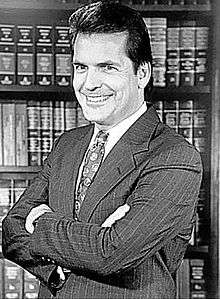Michael A. Hess
| Michael Anthony Hess | |
|---|---|
 | |
| Born |
Anthony Lee July 5, 1952 Sean Ross Abbey Roscrea, County Tipperary, Ireland |
| Died |
August 15, 1995 (aged 43) Washington, D.C., U.S. |
| Cause of death | Complications of AIDS |
| Resting place |
Sean Ross Abbey Roscrea, County Tipperary, Ireland |
| Nationality |
Irish (native) American (adopted) |
| Political party | Republican |
Michael Anthony Hess (July 5, 1952 – August 15, 1995) was an Irish-born American lawyer, deputy chief legal counsel and later chief legal counsel to the Republican National Committee (RNC) in the late 1980s and early 1990s.
He was born Anthony Lee to Philomena Lee in Ireland, and spent his first years of life in a convent before being adopted by Marge and Doc Hess of St. Louis, Missouri. The issues surrounding his adoption are controversial, as part of a program of forced adoptions practiced by some Catholic religious orders in Ireland at the time, and the story of that early part of his life was later told in British journalist Martin Sixsmith's book The Lost Child of Philomena Lee and in the film Philomena.[1]
Personal life
Hess's birth mother became pregnant at age 18 at a local carnival by a man named John who worked for the post office. She was then sent to the Sean Ross Abbey, a place for unwed mothers, in Roscrea in Ireland. After she gave birth to Hess, she was able to be with her child until she was 22 and he was three while living in the abbey. As was common practice in Ireland at the time, the church sold him to a Catholic family in the United States.[2] Lee did not know where her son was sent by the nuns when she left the abbey after being forced into signing the adoption papers.[3]
Hess grew up in the Midwest and was raised in a Catholic family.[4] He graduated from the University of Notre Dame in 1974 and earned a law degree at George Washington University.[5]
He made three visits to Ireland to try to find his mother but was unsuccessful in persuading the sisters to divulge any information. He requested that his ashes be buried at the convent where he was born in the hope that his mother would eventually be able to find his grave. Hess never learned who his mother was. In the 2000s, journalist Martin Sixsmith, working with Lee, discovered that Hess was Lee's son.[2]
He did not publicly acknowledge his homosexuality, particularly in his professional life. He died from complications of AIDS, although this was not mentioned at the memorial service held for him.[6] Hess's partner for the last 15 years of his life was Steve Dahllof. Dahllof credited the book The Lost Child of Philomena Lee with "about a three out of 10, in terms of accuracy", while the movie Philomena, "in accuracy of spirit, is 10 out of 10."[7]
Career
Hess became deputy chief legal counsel to the Republican National Committee, eventually rising to chief legal counsel. He was an important figure in the redistricting battles of the late 1980s and early 1990s, and was admired for his integrity and pursuit of justice on this issue.[8]
Controversy
The programme of forced adoptions by some ecclesiastical authorities in Ireland and elsewhere during the 1950s has raised considerable debate, and the Michael Hess case has further highlighted this.[9] Much of the paperwork relating to this program was later destroyed, and access to adoption archives has been cut off.[10]
Film
A film portraying Hess's adoption and his mother's later search for him was released in 2013. Philomena, directed by Stephen Frears and based on the book The Lost Child of Philomena Lee, starred Judi Dench as his mother; Sean Mahon as Hess, and Steve Coogan as Martin Sixsmith, the journalist who helped Philomena Lee identify her son.
References
- ↑ Sixsmith, Martin (August 11, 2011). The Lost Child of Philomena Lee: A Mother, Her Son and a Fifty Year Search. Macmillan. ISBN 978-0-230-74427-1. Retrieved August 9, 2014. (subscription required (help)).
- 1 2 Sixsmith, Martin (September 18, 2009). "The Catholic church sold my child". The Guardian. Retrieved September 8, 2014.
- ↑ Midgette, Anne. "The real Philomena Lee finds Hollywood ending to adoption story". The Washington Post. Retrieved August 9, 2014.
- ↑ Bernstein, Jacob (January 10, 2014). "Searching for Philomena's Real Son". The New York Times. Retrieved August 9, 2014.
- ↑ Fosmoe, Margaret (January 15, 2014). "Lost boy in 'Philomena' was 1974 ND graduate". South Bend Tribune. Retrieved January 15, 2014.
- ↑ Sixmith, Martin (September 26, 2009). "Stolen from his mother - and sold to the highest bidder". Daily Mail. Retrieved August 9, 2014.
- ↑ Todd S. Purdum (January 20, 2014). "Philomena and the back story of a D.C. insider". Politico. Retrieved January 31, 2015.
- ↑ Grofman, Bernard, ed. (January 1, 2003). Race and Redistricting in the 1990s. Algora Publishing. ISBN 978-0-875-86265-1. Retrieved August 9, 2014. (subscription required (help)).
- ↑ "Magdalene laundries support scheme unveiled". BBC News. June 26, 2013. Retrieved February 14, 2014.
- ↑ Daley, Suzanne; Dalby, Douglas (November 29, 2013). "A Forced Adoption, a Lifetime Quest and a Longing That Never Waned". The New York Times. Retrieved January 25, 2013.